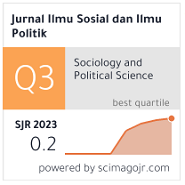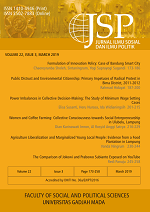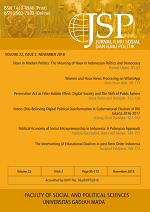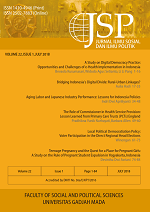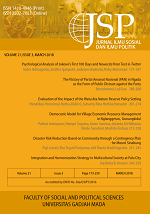The Regime of Truth, Partnerships, and Palm Oil Expansion in East Kalimantan, Indonesia
Sudirman Sudirman(1*)
(1) Department of Public Administration, Universitas Kutai Kartanegara, Indonesia
(*) Corresponding Author
Abstract
A large part of the uplands in East Kalimantan has been converted to oil palm plantations through partnership schemes, making it increasingly difficult for the indigenous Dayak people to find land for swidden agriculture. Therefore, a better understanding of partnership discourses and narratives is needed. This article adopts a Foucauldian perspective on truth regimes and ethnographic methods to examine the Indonesian government's strategy to expand state space for oil palm expansion in Dayak customary lands in East Kalimantan. This article argues government strategies need to be formulated by involving a robust analysis of the circular power-knowledge relationship. This perspective allows an understanding of partnerships at the discourse level, i.e., as an extension of power, not just stories about community empowerment behind the invisible hands of capitalism. Oil palm partnerships are a temporary policy structure as it confronts another power‐knowledge configuration: the Dayak community. Within this framework, customary practices are not static but are redefined continuously. In the uplands of East Kalimantan, oil palm agribusiness partnership policies often result in subjugating, disqualifying, and marginalizing practices. This article also investigates the implications of the formation of oil palm truth regimes.
Keywords
Full Text:
PDFReferences
Arellano‐Yanguas, J., & Bernal‐Gómez, M. (2017). Partnerships for development in the extractive sector: protecting subterranean interests? Journal of Environmental Policy & Planning, 19(3), 251-265. https://doi.org/10.1080/1523908X.2017.1302321.
Baka, J. (2013). The political construction of wasteland: Governmentality, land acquisition and social inequality in South India. Development and Change, 44, 409-428.
Borras, S., & Franco, J. (2013). Global land grabbing and political reaction from below. World Quartely, 34(9), 1723-1747.
Borras, S., & Franco, J. C. (2010). Contemporary discourses and contestations around pro-poor land policies and land governance. Journal of Agrarian Change, 10, 1-32.
Borras, S., Fig, D., & Saurez, S. (2011). The politics of agrofuels and mega-land and water deals: insights from Mozambique's ProCana case. Review of African Political Economy, 38(128), 215-234.
BPS. (1991-2015). Statistik padi dan palawija Provinsi Kalimantan Timur (1991-2015). Samarinda: Badan Pusat Statistik (BPS) Provinsi Kalimatan Timur.
Buse, K., & Harmer, A. (2009). ‘Global health partnerships: the mosh pit of global health governance’. In K. Buse, W. Hein, & N. Drager, Making Sense of Global Health Governance: A Policy Perspective (p. 245). Basingstoke: Palgrave.
Clegg, S. (1989). Frameworks of power. London: Sage Publications.
Colchester, M., & Chao, S. (2013). Pendahuluan. In M. Colchester, & S. Chao, Konflik atau Mufakat? Sektor Kelapa Sawit di Persimpangan Jalan (pp. 7-24). Forest People Programme- Perkumpulan Sawit Watch‐Transformasi Untuk Keadilan Indonesia.
Colchester, M., Jiwan, N., Andiko, Sirait, M., Firdaus, A. Y., Surambo, A., & Pane, H. (2006). Tanah yang dijanjikan: Minyak sawit dan pembebasan tanah di Indonesia–implikasi terhadap masyarakat lokal dan masyarakat Adat. England: Forest People Program (FPP) & Bogor: Sawit Watch (SW).
Cooke, F. M. (2006). Expanding State Spaces: Using ‘Idle’ Native Customary Land in Sarawak. In F. Cooke, State, Community and F orest in Contemporary Borneo. Canberra: Australian University E Press.
Da Silva, C. (2005). The growing role of contract farming in agri-food system development: Driver, theory and practice. Rome: FAO.
Dahlstedt, M. (2009). The partnering society: Governmentality, partnerships and active local citizenship. The Open Urban Studies Journal, 2, 18-27.
Dean, M. (2009). Governmentality: Power and rule in modern society. London: Sage Publication.
Deininger, K. (2011). Challenges posed by the new wave of farmland investment. Journal of Peasant Studies, 38(2), 217–247.
Dinas Perkebunan Kaltim. (2012, April 28). disbun.kaltimprov.go.id. Retrieved from disbun.kaltimprov.go.id/artikel: https://www.google.com/url?sa=t&s ource=web&rct=j&url=https://www. dis bun.kaltim prov.go.id/artikel/program-sejuta-hektare-sawit-kaltim- terwujud&ved=2ahUKEwiFiK‐K_svzAh Wd63MBHWtpBF8QFnoECAoQAQ&us g=AOvVaw2UlA6sp9pr7hMZDaQgwJ3u
Dinas Lingkungan Hidup Provinsi Kalimantan Timur. (2020). Dokumen Kajian Lingkungan Hidup Strategis (KLHS) Rencana Tata Ruang Wilayah Provinsi Kalimantan Timur Tahun 2020. Samarinda.
Dove, M. (1983). Theories of swidden agriculture: and the political economy of ignorance. Agroforestry System, 1, 85-99.
Dove, M. (2002). Representasi "Orang yang Berbudaya Lain" oleh "Orang-orang Lain": Tantangan Etnografis tentang Pandangan Pengusaha Perkebunan terhadap Petani Kecil di Indonesia. In T. M. Li, Proses Transformasi Daerah Pedalaman di Indonesia (pp. 247-290). Jakarta: Yayasan Obor Indonesia.
Dreyfus, H., & Rabinow, P. (1982). Michel Foucault: Beyond Structuralism and Hermeneutics. Brighton: Harvester Press.
Du Toit, A. (2007). Adverse incorporation and agrarian policy in South Africa. Or, how not to connect the rural poor to growth. Retrieved from: http://repository.uwc.ac.za/xmlui/bitstream/handle/10566/65/ duToit_Adverse2009.
Fairhead, J., & Leach, M. (1996). Misreading the African Landscape: Society and Ecology in a Forest-Savanna Mosaic. Cambridge: Cambridge University Press.
Ferguson, J. (1994). The anti-politics machine: development, depoliticization, and bureaucratic power in Lesotho. Minneapolis: University of Minnesota Press.
Foucault, M. (1977). The political function of the intellectual. Radical Philosophy, 17, 12-14.
Foucault, M. (1991). Space, knowledge and power. In P. Rabinow, The Foucault Effect (pp. 239-256). Harmondsworth: Penguin.
Foucault, M. (1995). Discipline and punish: The birth of the modern prison. Trans. Alan Sheridan. New York: Vintage Book.
Foucault, M. (2000). Truth and power. In P. Rabinow, Essential Works of Foucault 1954–1984 (pp. 111-133). New York: The New Press.
Foucault, M. (2003). Society must be defended. lectures at the collège de France 1975-1976. trans. D. Macey. New York: Picador.
Foucault, M. (2007). Security, territory, population. Lectures at the Collège de France, 1977-1978. New York: Palgrave.
Foucault, M. (2008). Birth of biopolitics: Lectures at the college de France 1978-79. New York: Palgrave Macmillan.
Franco, J., Levidow, L., Fig, D., Goldfarb, L., Honicke, M., & Mendoca, L. (2010). Assumption in the European Union biofuels policy: friction with experiences in Germany Brazil and Mozambique. The Journal of Peasant Studies, 37(4), 661-698.
Gellert, P. K. (2015). Palm oil expansion in Indonesia: Land Grabbing as Accumulation By Dispossession. Social Theory, 34, 65-99. https://doi.org/10.1108/S0278‐120420150000034004.
Gidwani, V. (1992). “Waste” and the permanent settlement in Bengal. Economic Political Weekly, 27(4), 39–46.
Gidwani, V., & Reddy, R. (2011). The afterlives of “waste”: Notes from India for a minor history. Antipode, 43(5), 1625-1658.
Hall, D., Hirsch , P., & Li, T. (2011). Powers of exclusion: Land dilemmas in Southeast Asia. Singapore: NUS Press.
Hall, S. (1992). The West and the rest. In S. Hall, & B. Gieben, Formation of Modernity (pp. 275-320). Cambridge: Polity Press.
Haque, M. S. (1999). The fate of sustainable development under Neo-liberal Regimes in Developing Countries. International Political Science Review, 20(2), 197-218.
Harvey, D. (2003). The new imperialism. Oxford: Oxford University Press.
Havnevik, K. (2011). Grabbing of African lands for energy and food: implications for land rights, food security and smallholders. In P. B. Matondi, H. Kjell, & B. Atakilte, Biofuels, land grabbing and food security in Africa (pp. 20-43). London-NewYork: Zed Books.
Irwin, G. (1955). Nineteenth century Borneo: A study in diplomatic rivalry. Gravanhage: Martinus Nijhoff.
Julia, & White, B. (2012). Gendered experiences of dispossession: Palm oil expansion in a Dayak Hibun community in West Kalimantan. The Journal of Peasant Studies, 39(3-4), 995-1016. https://doi.org/10.1080/03066150.2012.676544.
kaltimkece.id. (2019). kaltimkece.id. Retrieved from kaltimkece.id/warta/lingkungan: https://www.google.com/url?q=https://kaltimkece.id/warta/lingkungan/detail‐perizinan-kaltim-yang-lebih-luas-dari-daratan-provinsi-dan-membuat- murka‐pimpinan‐kpk&sa=U&ved=2ah UKEwjYsYv436XxAhVv_XMBHaCIA EMQFjABegQIARAB&usg=AOvVaw2F_F3mTZUvX2muAXwVk4vk
Kementerian Pertanian. (2007). Permentan No. 26 Tahun 2007 tentang Pedoman Perizinan Usaha Perkebunan. Jakarta: Kementerian Pertanian.
Kurniawan, N. I. (2016). Local struggle, recognition of Dayak customary land, and state making in Central Kalimantan, Indonesia [Thesis]. Asia Institute, Faculty of Arts, University of Melbourne.
Lemke, T. (2001). Thee birth of biopolitics: Michel Foucault’s lecture at the College de France on neoliberal governmentality. Economy and Society, 30(2), 190-207.
Lemke, T. (2007). An indiges tible meal? Foucault, governmentality and state theory. Journal of Social Theory, 8(2), 43-64.
Li, T . M. (2007). The will to improv e: Governmentality, development, and the practice of politics. Durham & London: Duke University Press.
Lindblad, J. (1988). Between Dayak and Dutch. Dordrecht-Holland: Foris Publications.
Martin, P. (1997). The constitution of power in landcare: A post-structuralist perspective with modernist undertones. In S. Lockie, & F. Vanclay, Critical Landcare (pp. 45-46). Wagga Wagga: Centre for Rural Social Research.
McCarthy, J. F. (2010). Processes of inclusion and adverse incorporation: Palm oil and agrarian change in Sumatera, Indonesia. The Journal of Peasant Studies, 821-850. https://doi.org/10.1080/03066150.2010.512460.
McCarthy, J., & Cramb, R. (2009). Policy narratives, landholder engagement, and palm oil expansion on the Malaysian and Indonesian frontiers. The Geographical Journal, 175, 112-123.
McCarthy, J., Gillespie, P., & Zen, Z. (2012). Swimming upstream: Local Indonesian production networks in “globalized” palm oil production. World Development, 40(3), 555-569.
O’Malley, P. (1996). ‘Indigenous governance’. Economy and Society, 25(3), 310-336.
Pramono, A. (2014). Perlawanan atau pendisiplinan? Sebuah refleksi kritis atas Pemetaan Wilayah Adat. Wacana, 33, 207-242.
Rose, N. (1996). The death of the social? Re-figuring the territory of government’. Economy and Society, 25(3), 327-56.
Scott, J. C. (1998). Seeing Like a State: How Certain Schemes to Improve the Human Condition Have Failed. New Haven: Yale University Press.
Shibao, P. (2015). Mengapa sawit berkembang menjadi Komoditas utama Indonesia?. Retrieved from https://www.mongabay.com/.
Tim Riset PASPI. (2017). Proses reforestasi dan perbaikan ekologi melalui perkebunan kelapa sawit di Provinsi Kalimantan Timur. Palm Oil Agribusiness Strategic Policy Institute (PASPI).
Thung, P.H. (2018). A case study on the persistence of Swidden agriculture in the context of post-2015 anti-haze regulation in West‐Kalimantan. Human Ecology, 46, 197-205.
Toumbourou, T. D., & Dressler, W. (2020). Sustaining livelihoods in a palm oil enclav e: Differentiated gendered responses in East Kalimantan, Indonesia. Asia Pacific Viewpoint. Asia Pacific Viewpoint, https://doi.org/ 10.1111/ apv.12265.
Uexkull, H., & Fairhurst, T. (1991). Fertilizing for high yield and quality. The Palm oil. IPI.
Vandergeest, P., & Peluso, N. (1995). Territorialization and state power in Thailand. Theory and Society, 24(3), 385-426.
Vermeulen, S., & Goad, N. (2006). Towards better practice in smallholder palm oil production. UK: International Institute for Environment and Development.
von Uexkull, H. (1987). Acid soils in the humid tropics: managing the soil surface. Soil Management Under Humid Conditions in Asia (pp. 333-349). Khon Kaen, Thailand: International Board for Soil Research and Management (IBSRAM).
Warner, K. (2008). Agroecology as participatory science: Emerging alternativ es to technology transfer extension practice. Science, Technology and Human Values, 33(6), 754-777.
Watts, M. (1992). Living under contract: Work, production politics, and the manufacture of discontent in a peasant society. In A. Pred, & M. Watts, Reworking modernity: Capitalisms and symbolic discontent. (pp. 65-105). New Brunswick: Rutgers University Press.
Weir, L. (2008). The concept of truth regime. Canadian Journal of Sociology, 33(2), 367-389.
White, B. (2002). Inti dan plasma: Pertanian kontrak dan pelaksanaan kekuasaan di dataran tinggi Jawa Barat. In T. Li, Proses Transformasi Daerah Pedalaman di Indonesia (pp. 293-329). Jakarta: Yayasan Obor Indonesia.
White, G., & Dasgupta, A. (2010). Agrofuels capitalism: a view from political economy. The Journal of Peasant Studies, 37(4), 593-607.
Whitehead, J. (2010). John Locke and the governance of India's landscape: the category of wasteland in colonial revenue and forest legislation. Economic and Political Weekly, 45, 83-93.
Whitehead, J. (2012). John Locke, accumulation by dispossession and the governance of colonial India. Journal of Contemporary Asia, 42, 1-12.
World Bank. (2008). World Development Report 2008: Agriculture for Development. WoldBank.
Article Metrics
Refbacks
- There are currently no refbacks.
Copyright (c) 2023 Jurnal Ilmu Sosial dan Ilmu Politik

This work is licensed under a Creative Commons Attribution-ShareAlike 4.0 International License.







